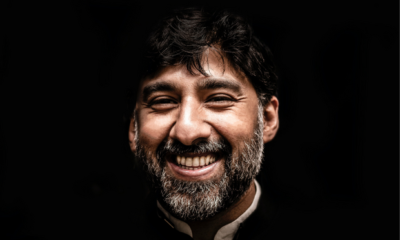Life
The 5 Stages of a Quarter-Life Crisis & What You Can Do
A quarter-life crisis isn’t a sign you’ve lost your way; it’s a sign you’re fighting for a life that’s truly yours.

The quarter-life crisis is a well-defined set of stages—Trapped, Checking Out, Separation, Exploration, Rebuilding—one goes through in breaking free from feelings of meaninglessness, lack of fulfillment, and misalignment with purpose. I detail the stages and interweave my story below.
If you’re in the trenches of this crisis, read on.
Thoughts from 14,000 Ft—How A Quarter Life Crisis Starts
I’m high in the Andes somewhere in Ecuador. Everything has a yellow tint to it—the mountains, vegetation, even the Andean animals.
It’s foggy, rainy, and fucking frigid. I’m drenched, freezing my ass off, and have fallen in the mud multiple times—and I’m having the time of my life.
It was December of 2021, and I’d never had this much fun or felt this free—certainly not in my five years of helping a large oil and gas company generate profits.
Back at the hostel, warm and surrounded by people and mountain dogs, the most common question was—”how long you in Ecuador for?”
Seemingly everyone responded with something like “ah, I’m traveling this entire continent, I’ve been at it for nine months.” Six months here, four there, another guy doing a year.
It was my turn to answer.
“Uh, five… days.”
I was cramming everything Ecuador had to offer into one week before I had to be back to my job in the US. The standard approach for los gringos.
If these European, Israeli, and Asian cats could scrape together the change and take the plunge into long-term travel, why couldn’t I?
Dedicating all of my life energy, mental capacity, and focus to pushing the agenda of Big Oil, and expending any leftovers on getting drunk to escape it, I was void of anything resembling exploration, purpose, and wander.
I was sitting on a mountain of cash from not doing shit while making a healthy oil salary. Money wasn’t the issue—fear of letting go was.
Little did I know, I’d just planted to seed that would grow into a fully blossomed, standard set of stages of a quarter life crisis.
Only later, after I’d clawed my way out of the final stage, would I realize how closely my journey matched this framework.
Side Note—Data
According to a LinkedIn study, 75% of 25- to 33-year-olds have experienced a quarter-life crisis, so you’re not alone if you feel this way (stressed, numb, depressed, lonely, purposeless, withdrawal, restlessness, aimless).
The Quarter Life Crisis In Stages
Stage 1: Trapped
I wake up. I drive to work. I work. I drive home. Pick up my dry-cleaning. Work out in to stay ‘healthy.’ Listen to a podcast. Cook. Shower. Sleep. Repeat.
“We do this for two years and then say—is this life?”
Dr. K, an expert on mental health and personal growth, describes this stage as trapped: the suffocating monotony of a life on autopilot.
My job gave me lots of approval from family and friends. They’d pat me on the back and say “you did it!”
Like many, I’d exited college hungry to touch a real check.
The checks were big, especially compared to my ramen-and-40s diet in college.
Yet, the novel money and lifestyle lose their shine over time, and things like purpose, passion, and a great life take the drivers seat.
Life became a predictable script. Grind all week, blow off steam on the weekend to escape.
For many, the script is tolerable—until it isn’t. The shift is subtle at first: a nagging voice asking, “Is this it?” But over time, the voice grows louder, pushing you toward a breaking point.
Stage 2: Checking Out
I’m over this shit.
Pointless meetings. Incompetent managers. Coworkers whose lives are terrifyingly similar to the one I’m hurtling toward. Except you, Will—you’re a real one.
At this stage, the mental break happens. You’re done. But physically, you’re still showing up.
This is a critical point in the overall process, and as Dr. K points out, it is a common, major mistake to try to check back in.
This is where many people stay stuck, forever fantasizing about what could be but never making a move. We tell ourselves, “It’s not so bad. I should be grateful. $100k a year isn’t nothing.”
That internal justification keeps us trudging forward, but the emptiness only deepens.
For months, I toyed with the idea of leaving it all behind. I’d sit at my desk and daydream about trekking solo through South America with just a backpack and a burner phone. At first, it felt like just that—a fantasy.
Most people stop here and remain for decades. Paralyzed by fear, inertia, and the illusion of safety.
But some of us—driven by an unrelenting dissatisfaction—reach a breaking point.
Stage 3: Separation
“You need space—psychological and physical—to get away from what you’re checked out from.”
The daydreams of South America turned into plans. Budgets. Timelines. A fear-setting exercise sealed the deal.
I timed it perfectly: my annual bonus would hit in April, my lease would end in May, and I’d resign in June. A week later, I’d be on a plane to Mexico.
And just like that, it was real. I landed in León with a black duffel bag slung over my shoulder and a buzzcut, looking exactly as sketchy as I’d intended.
I’d spend a month in Mexico, and then roughly one month per country in Colombia, Peru, Chile, Argentina, and Brazil for a total of six months of lone backpacking. [I didn’t make it to Brazil.]
This stage isn’t glamorous. It’s gritty, uncomfortable, and lonely at times. But that’s the point. Only by stepping away from what’s familiar can we create space for something new.
Stage 4: Exploration
Town after town. Mountain after mountain. Long, solo bus rides. Conversations with locals and fellow travelers. No Microsoft Teams pings, no meetings, no deadlines.
I was alive again.
But the real exploration wasn’t just of landscapes or cultures. It was of myself.
Spending extended time alone and learning to rely on yourself to make it home each night in foreign, at-times-sketchy places, teaches you about yourself.
What do I enjoy when no one’s watching? What do I value? What am I willing to tolerate? What brings me joy? What kind of life do I want to build?
When the noise of a high-stakes job, social obligations, and city living is stripped away, the signal becomes clear. In that clarity, I began redefining who I was.
Dr. K says, “Purpose isn’t discovered; it’s crafted.” And during those months, I was quietly building a blueprint.
Stage 5: Rebuilding
By the final months of my trip, my journal was full of plans for the life I wanted to create.
“I’ll join a men’s group. Train Muay Thai. Go to bachata socials. Take Spanish classes. Mentor a kid through Big Brothers Big Sisters. Start my own business.”
When I returned home, I did all of it—and more.
I’d built a new life, and arguably, a new me. I wasn’t the same timid, burnt-out corporate drone who’d left. I’d faced fears, dismantled insecurities, and proven to myself that I could craft a life worth living.
It sounds glamorous, but trust me—it was earned. Every skill, every connection, every moment of joy was a direct result of the painful work done in those earlier stages.
The Reframe
If you’re feeling trapped or checked out, you’re not failing. You’re waking up. A quarter-life crisis isn’t a sign you’ve lost your way; it’s a sign you’re fighting for a life that’s truly yours.
The fact that you’re questioning things means you care. And that’s the first step toward building something real.
Feeling purposeless isn’t a curse—it’s a gift.
So, what stage are you in? Let me know. You can DM me on IG, or hit me up however you like.
And definitely share the article if you got any value, and have friends in a similar place.
Thanks for reading.
Did You Know
How Skilled Migrants Are Building Successful Careers After Moving Countries
Behind every successful skilled migrant career is a mix of resilience, strategy, and navigating systems built for locals.

Moving to a new country for work is exciting, but it can also be unnerving. Skilled migrants leave behind familiar systems, networks, and support to pursue better job opportunities and a better future for their families. (more…)
Life
10 Research-Backed Steps to Create Real Change This New Year
This New Year could finally be the one where you break old patterns and create real, lasting change.

Every New Year, we make plans and set goals, but often repeat old patterns. (more…)
Life
9 Harsh Truths Every Young Man Must Face to Succeed in the Modern World
Before chasing success, every young man needs to face these 9 brutal realities shaping masculinity in the modern world.

Many young men today quietly battle depression, loneliness, and a sense of confusion about who they’re meant to be.
Some blame the lack of deep friendships or romantic relationships. Others feel lost in a digital world that often labels traditional masculinity as “toxic.”
But the truth is this: becoming a man in the modern age takes more than just surviving. It takes resilience, direction, and a willingness to grow even when no one’s watching.
Success doesn’t arrive by accident or luck. It’s built on discipline, sacrifice, and consistency.
Here are 9 harsh truths every young man should know if he wants to thrive, not just survive, in the digital age.
1. Never Use Your Illness as an Excuse
As Dr. Jordan B. Peterson often says, successful people don’t complain; they act.
Your illness, hardship, or struggle shouldn’t define your limits; it should define your motivation. Rest when you must, but always get back up and keep building your dreams. Motivation doesn’t appear magically. It comes after you take action.
Here are five key lessons I’ve learned from Dr. Peterson:
-
Learn to write clearly; clarity of thought makes you dangerous.
-
Read quality literature in your free time.
-
Nurture a strong relationship with your family.
-
Share your ideas publicly; your voice matters.
-
Become a “monster”, powerful, but disciplined enough to control it.
The best leaders and thinkers are grounded. They welcome criticism, adapt quickly, and keep moving forward no matter what.
2. You Can’t Please Everyone And That’s Okay
You don’t need a crowd of people to feel fulfilled. You need a few friends who genuinely accept you for who you are.
If your circle doesn’t bring out your best, it’s okay to walk away. Solitude can be a powerful teacher. It gives you space to understand what you truly want from life. Remember, successful men aren’t people-pleasers; they’re purpose-driven.
3. You Can Control the Process, Not the Outcome
Especially in creative work, writing, business, or content creation, you control effort, not results.
You might publish two articles a day, but you can’t dictate which one will go viral. Focus on mastery, not metrics. Many great writers toiled for years in obscurity before anyone noticed them. Rejection, criticism, and indifference are all part of the path.
The best creators focus on storytelling, not applause.
4. Rejection Is Never Personal
Rejection doesn’t mean you’re unworthy. It simply means your offer, idea, or timing didn’t align.
Every successful person has faced rejection repeatedly. What separates them is persistence and perspective. They see rejection as feedback, not failure. The faster you learn that truth, the faster you’ll grow.
5. Women Value Comfort and Security
Understanding women requires maturity and empathy.
Through books, lectures, and personal growth, I’ve learned that most women desire a man who is grounded, intelligent, confident, emotionally stable, and consistent. Some want humor, others intellect, but nearly all want to feel safe and supported.
Instead of chasing attention, work on self-improvement. Build competence and confidence, and the rest will follow naturally.
6. There’s No Such Thing as Failure, Only Lessons
A powerful lesson from Neuro-Linguistic Programming: failure only exists when you stop trying.
Every mistake brings data. Every setback builds wisdom. The most successful men aren’t fearless. They’ve simply learned to act despite fear.
Be proud of your scars. They’re proof you were brave enough to try.
7. Public Speaking Is an Art Form
Public speaking is one of the most valuable and underrated skills a man can master.
It’s not about perfection; it’s about connection. The best speakers tell stories, inspire confidence, and make people feel seen. They research deeply, speak honestly, and practice relentlessly.
If you can speak well, you can lead, sell, teach, and inspire. Start small, practice at work, in class, or even in front of a mirror, and watch your confidence skyrocket.
8. Teaching Is Leadership in Disguise
Great teachers are not just knowledgeable. They’re brave, compassionate, and disciplined.
Teaching forces you to articulate what you know, and in doing so, you master it at a deeper level. Whether you’re mentoring a peer, leading a team, or sharing insights online, teaching refines your purpose.
Lifelong learners become lifelong leaders.
9. Study Human Nature to Achieve Your Dreams
One of the toughest lessons to accept: most people are self-interested.
That’s not cynicism, it’s human nature. Understanding this helps you navigate relationships, business, and communication more effectively.
Everyone has a darker side, but successful people learn to channel theirs productively into discipline, creativity, and drive.
Psychology isn’t just theory; it’s a toolkit. Learn how people think, act, and decide, and you’ll know how to lead them, influence them, and even understand yourself better.
Final Thoughts
The digital age offers endless opportunities, but only to those who are willing to take responsibility, confront discomfort, and keep improving.
Becoming a man today means embracing the hard truths most avoid.
Because at the end of the day, success isn’t about luck. It’s about who you become when life tests you the most.
Change Your Mindset
The Four Types of Happiness: Which One Are You Living In?
Most people chase success only to find emptiness, this model reveals why true happiness lies somewhere else.

In a world driven by rapid technological growth and constant competition, many people unknowingly trade joy for achievement. (more…)
-

 Did You Know4 weeks ago
Did You Know4 weeks agoHow Skilled Migrants Are Building Successful Careers After Moving Countries
-

 Health & Fitness3 days ago
Health & Fitness3 days agoWhat Minimalism Actually Means for Your Wellness Choices
-

 Business2 days ago
Business2 days agoIf Your Business Internet Keeps Letting You Down, Read This
-

 Did You Know2 days ago
Did You Know2 days agoWhy Most Online Courses Fail and How to Fix Them
























